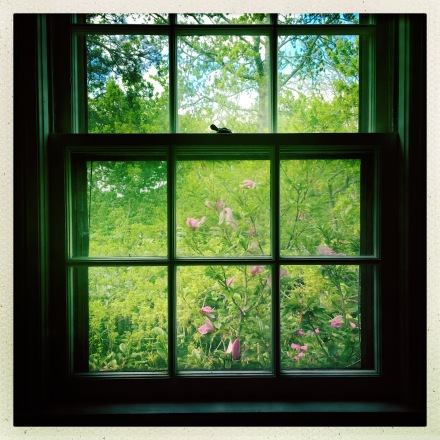
Last summer, we bought a house that had been the longtime home of a lover of gardens, a woman who came to Nova Scotia from another country in her youth and then, alongside her husband, raised three children here. We—me, Koun, our two children (all from another country as well)—did not meet her, but she left behind a legacy of plant life that we are coming to know.
It is our first spring in this house. We have witnessed a late summer, a fall, a winter—but not a spring. It seems each morning I awaken to a new shoot pushing up through the earth, or a leaf or a flower bursting from a tender green bud. Such a decadent and carefully choreographed display—like fireworks in slow, slow motion.
Having never been a gardener, and also having grown up so far from here, I can’t name many of the cultivated plants surrounding our property. Some of them I only know in Japanese—fuji, mokuren. Or I know them because they also exist in the wilds of my first home, Alaska: iris, rose, strawberry, daisy, some variety of lily, forget-me-nots. The last I can’t help but call wasurenagusa—the “grass of not forgetting” (maybe because it moved me when I learned, and immediately understood, this word so long ago in Japan).
Our new house is old, built in the early 1950s, and the woman who lived here for much of her life was much older. She passed away in the fall, in the year before our family moved in. Our neighbors tell us stories of witness. She was kind, and she was also not kind. Lately, we are becoming the sort of people who uproot and trim and shape. I hope we are kind. But maybe we are not the best judges of our own characters. I am rarely certain what is weed and what is precious. From the perspective of a dandelion, I am ruthless, cruel. Maybe those brilliant yellow beauties deserve better.
When I was younger, a lost traveler in my 20s, and living in Japan, I was taught the term hanakotoba—the “language of flowers.” Each flower holds a meaning and intention—a character or some quality—as it is passed from one person to another. I found that it is the very old who carry this knowledge. And I learned of it such a long time ago. Perhaps, so many years later, it is mostly forgotten, so that certain beauty exists now without a context.
I wonder if the woman who lived in our house, at some moment in mid-life as I am now, was ever compelled to bend down to examine a small blue flower, if somehow she could hear a whispered word through that trajectory of time—that suggestion of a history, or of a future: “wasurenagusa, wasurenagusa, wasurenagusa. . .” Her children loud and laughing, tumbling amongst the greenery around her. A cloudless blue sky above.
Maybe we are all just accidental gardeners. We look after what we are given, or what we create. We tend it well or we do not. In this way, a garden moves through the seasons and never forgets. The dirt beneath our fingernails, sticky sap against our wrists.

So many doorways into this beautiful entry…. The freshness of the spring gifts and the earth that was once turned by old hands long gone. I stopped in my tracks the other day because of a white flowering pant, realizing it was a pale version of ‘broken hearts’ … but maybe they are called bleeding hearts…I remember a large, thriving plant splashing their colours over the flower bed…so your story dreams me back into mine! i am revelling about flower slang and dialects:) now…thank you for your writing Tracy!!!
Thank you, Tracy. The bliss of reading, the bliss of gardening.
Fine writing
You say that from the perspective of a dandelion, you are ruthless, cruel. You can change that and let the dandelions live. They are the first flowers to bloom and feed the bees after a long winter. When they are young and tender, you can add the leaves to your salad as long as you don’t apply chemicals to your yard. They are beautiful and beneficial flowers and I love having them surround me in my home. Beautiful writing. Thank you.